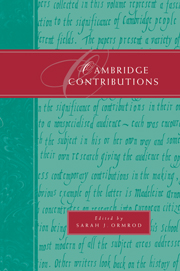Book contents
- Frontmatter
- Contents
- Notes on contributors and contributions
- Preface
- 1 Some Cambridge contributions to astronomy and cosmology
- 2 Cambridge's contribution to medical science
- 3 Cambridge and the study of English
- 4 The Cambridge contribution to economics
- 5 ‘Nasty forward minxes’: Cambridge and the higher education of women
- 6 Cambridge Classics for the third millennium
- 7 Cambridge contributions: the philosophy of science
- 8 European citizenship and education
- 9 The University Botanic Garden
- 10 Geophysics in Cambridge: extinct and active volcanoes
- 11 Cambridge spies: the ‘Magnificent Five’, 1933–1945
3 - Cambridge and the study of English
Published online by Cambridge University Press: 31 December 2009
- Frontmatter
- Contents
- Notes on contributors and contributions
- Preface
- 1 Some Cambridge contributions to astronomy and cosmology
- 2 Cambridge's contribution to medical science
- 3 Cambridge and the study of English
- 4 The Cambridge contribution to economics
- 5 ‘Nasty forward minxes’: Cambridge and the higher education of women
- 6 Cambridge Classics for the third millennium
- 7 Cambridge contributions: the philosophy of science
- 8 European citizenship and education
- 9 The University Botanic Garden
- 10 Geophysics in Cambridge: extinct and active volcanoes
- 11 Cambridge spies: the ‘Magnificent Five’, 1933–1945
Summary
It may already have struck you that a series of lectures on ‘Cambridge Contributions’ runs the risk of appearing complacently parochial. Collectively, we may seem to be suggesting that most of the significant developments in the intellectual history of the world originated within this University; the result may all too easily end up sounding like a whole fanfare of blowing our own trumpets. I have no wish to contribute to this effect, and it may help if I say from the outset that the reasons why a particular place gets a reputation for having made such an important intellectual contribution to a given discipline often have a great deal to do with luck and timing, with the state of the discipline at that particular moment, and even, if we are realistic about it, with the political and economic power of the country in question. If a lecture-series such as this were to be given in one hundred years' time from now, I suspect that the person lecturing on the study of English would probably have to say that, in the English-speaking world at the beginning of the twenty-first century, the really significant and influential intellectual developments were much more likely to be found in the United States than in Britain. In terms of the work associated with individual universities, the imaginary future lecturer would be more likely to concentrate on the influence on the people teaching English at Cambridge of figures from Yale or Johns Hopkins or Berkeley rather than assuming that the balance of intellectual trade was the other way round.
- Type
- Chapter
- Information
- Cambridge Contributions , pp. 42 - 64Publisher: Cambridge University PressPrint publication year: 1998
- 3
- Cited by



